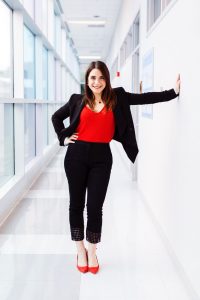Branch
Select your branch
Meet Marina Rincón and MJN Neuroservices, the IMAGINE IF! Barcelona winners
 Marina Rincon-Torroella is passionate about analyzing and improving the healthcare system. She defines herself as a workaholic; something that we found apparent when we looked at her career path so far. She works at Mayo Clinic and wears many hats. Her main focus at Mayo Clinic is to assist with their business development. Outside of work she is involved with MJN Neuroserveis; a start-up that focuses on the prevention of seizures -a first of its kind. She did not stop there and has since created her own start-up Weallare.Co, which provides custom solutions for physical therapy patients.
Marina Rincon-Torroella is passionate about analyzing and improving the healthcare system. She defines herself as a workaholic; something that we found apparent when we looked at her career path so far. She works at Mayo Clinic and wears many hats. Her main focus at Mayo Clinic is to assist with their business development. Outside of work she is involved with MJN Neuroserveis; a start-up that focuses on the prevention of seizures -a first of its kind. She did not stop there and has since created her own start-up Weallare.Co, which provides custom solutions for physical therapy patients.
A driving thought in all of her work comes from her favorite saying: “First I learn the rules to play the game, then I change the rules to better the game”. This is what defines her attitude towards her choices.

- Marina, thank you for agreeing to give this interview despite your busy schedule. Can you tell us a little bit about yourself, your experience as an entrepreneur, your current position in the Mayo clinic in Florida, and your role in MJN Neuroserveis?
I trained as a physical therapist at The Autonomous University of Barcelona (UAB). During my last internship in the Netherlands as the physical therapist of the under 21 national basketball team, I soon realized that this was not the optimal career path for me. In 2014 I was awarded a scholarship to pursue a master’s degree in biodesign, innovation and entrepreneurship in Barcelona, where I evolved my business-oriented mind. However, what defined my career goals was my later work experience in the hospital treating palliative patients and elderly people. They taught me the value of life and to pursue your goals with passion and happiness. That is where I dedicated my career goal to understand and improve the healthcare system in order to create an efficient system to offer better treatment to our society, to my family and to myself.
I will always remember the stories of my patients and their needs. That was the turning point for building my early stage start-up in design and physiotherapy – WeallareCo with my co-founder Fanny Basanta. Our company creates personalized devices according to each person’s needs.
At that time, I stopped working in Spain and I moved to the USA to learn about the private sector where I started working at Johns Hopkins hospital in Baltimore. There, I was fortunate to meet Dr. Alfredo Quiñones-Hinojosa, the current chair of Neurosurgery at Mayo Clinic, whose career and patient-oriented passion to find a cure for cancer inspired me to have the courage to keep fighting for a better healthcare system. a cure for cancer inspired me to have the courage to keep fighting for a better healthcare system.
At the Mayo Clinic, my work focuses on improving the communication strategy towards the patients through understanding and implementing their needs.
During my first months at Mayo Clinic, I was contacted by David Blánquez, the CEO of MJN Neuroserveis who asked me to help them with their international relationships and with their participation in the IMAGINE IF! Acceleration Program. I had no doubts. Having the chance to collaborate with a company in my home city to improve the epilepsy community as MJN does; I immediately said yes!
- That brings me to my next question. Last year you represented MNJ Neuroserveis in the IMAGINE IF! Accelerator Program. Can you tell us about your experience during this program and how it has helped you with the business development plans of MJN Neuroscience?
I really enjoyed the whole process and experience! IMAGINE IF! has greatly increased the visibility of MJN Neuroserveis and has helped us to expand our network. I have developed great relationships with the mentors and the people involved. For many of them, we are still in contact, helping each other. While in Oxford, I felt it was a great opportunity to jump into a new market. I was able to reach more people that were able to support and help us during and after the program. If the end-goal of any start-up is to reach the patient and increase your visibility, then IMAGINE IF! is a great opportunity for everyone.
- What would your advice be for the 2018 IMAGINE IF! applicants?
My first piece of advice is to be prepared for it and apply or participate only if you are willing to devote your time to it. Everyone who is willing to attend has to go to the lectures and get the most out of them. Do not apply just for the sake of applying, but because you want to win!
Finally, in my opinion, what you need to get from IMAGINE IF! depends on the stage of your start-up. In IMAGINE IF! you can encounter both late and early stage start-ups. This is a great opportunity for future applicants, especially those at early stages, to exchange information and learn from each other and their mentors. Enjoy the whole process, because you can only benefit from it.
- What is the current stage of MJN Neuroscience’s business development?
MJN Neuroserveis has already closed the second round of investment of €750.000 and we are doing a clinical trial with Clinica Corachan. We have also recently been awarded another program that has given us the opportunity to be part of the Mobile World congress and increase our visibility internationally.
- As you already mentioned, you are also a co-founder of WeallareCo. What is the purpose of the company?
Fanny Basanta, my co-founder, or as we like to call each other “Co” and I have created WeallareCo to help people with diverse physical realities and needs with new products. We personalise devices according to patients’ needs to facilitate their daily activities. Our first product is SILMA, a glove for upper and passive prosthetics that protects the user from possible damage while helping maintain day-to-day functionality. Last November, we received our first public funds as the winners of the Mujer Emprendedoras contest from Madrid and we were selected for AirB&B as women entrepreneurs in Spain. Weallare.Co is an early stage; we are sourcing funds to obtain the CE mark and tonstart selling SILMA.
- Finally, I would like to know your views on how we can accelerate the integration of science and innovation in the healthcare system in Spain?
I will quote one of my mentors at Mayo Clinic, Adam Thompson, who taught me something I think is key for the future and for any acceleration of innovation in healthcare.
He said, “if your colleagues do not understand what you are sharing with them, just educate them”. Thus, if we want to accelerate the integration of science and innovation in Spain, we have to educate and create the environment to make it happen. Technology is becoming key in developing new treatments and solutions for our patients. We need to educate not only the future, but also the current doctors, nurses, physical therapists and caregivers with an innovative-science mindset. Translational science is key in research and the hea

lthcare community needs to understand how to translate their basic findings into the clinic and transform them into practical solutions. We need to educate scientists to communicate their ideas in a more business-oriented manner and always think out of the box. This also implies that some policies and old-fashioned educational programs have to drastically change, and investment must support research and innovations.
We all need to influence the environment to drive innovation in healthcare, and education and investment are key to make that happen!
